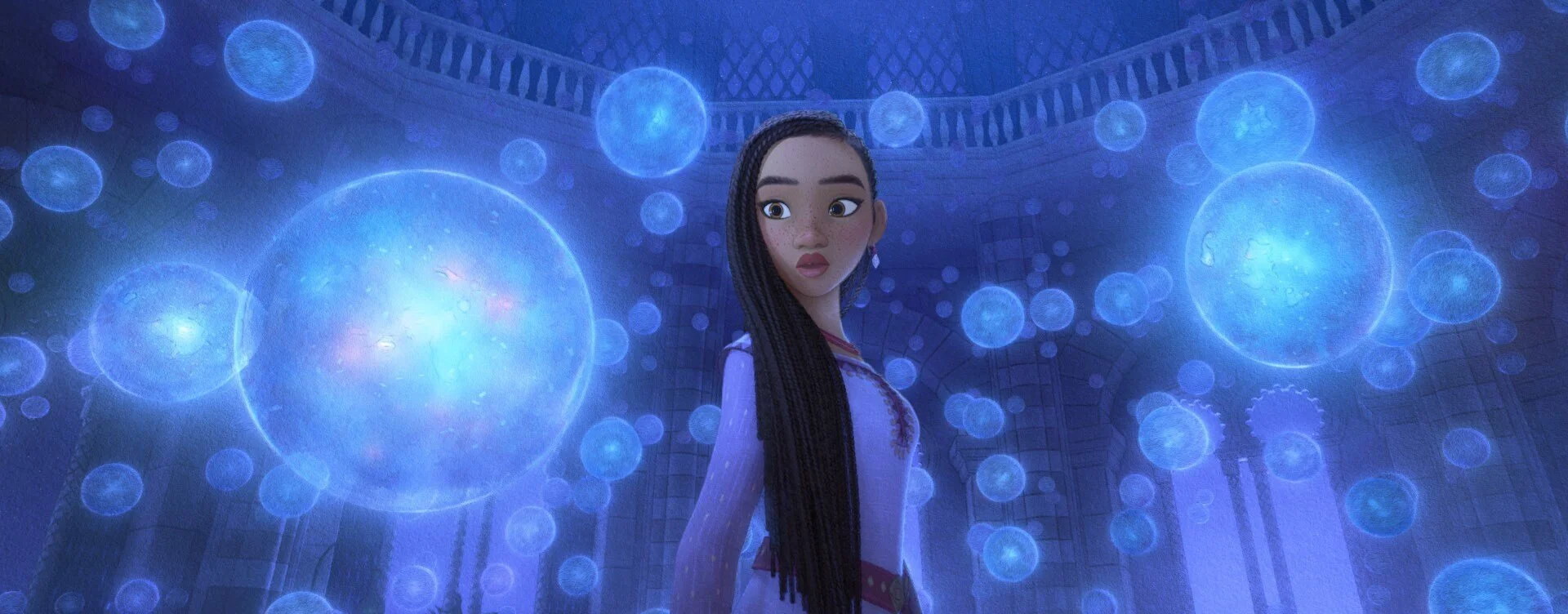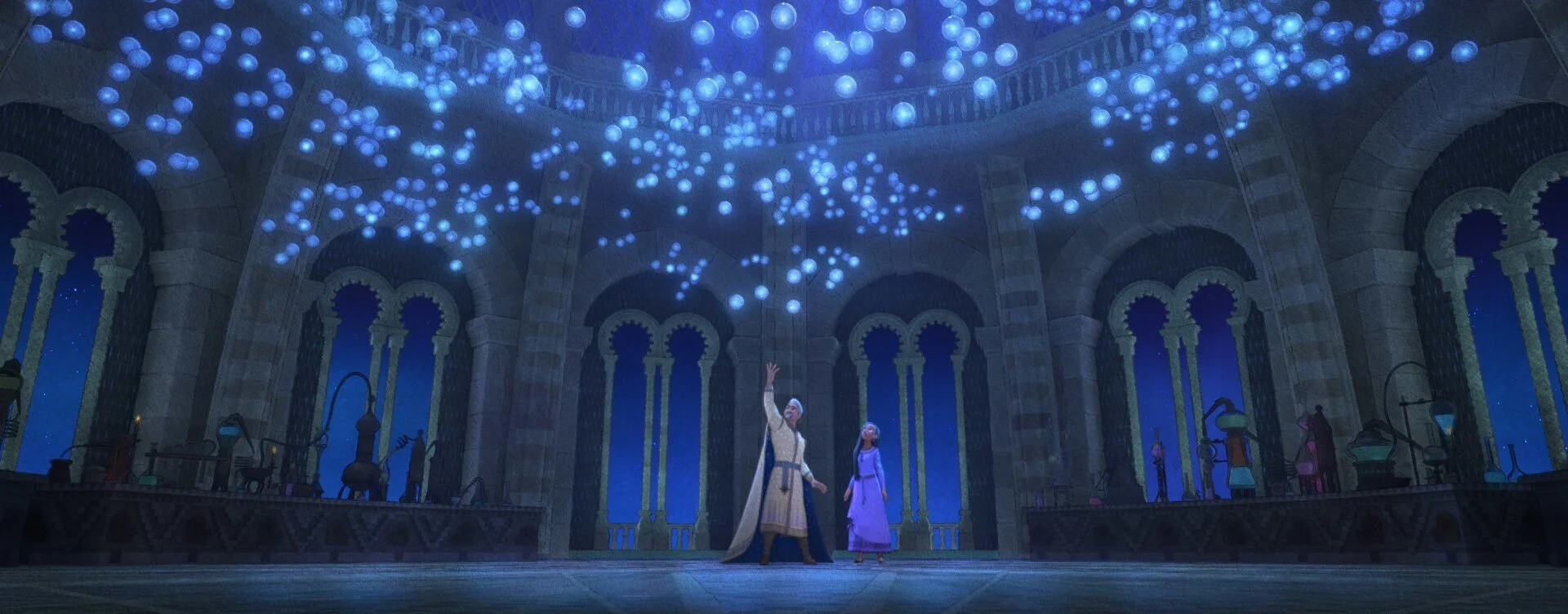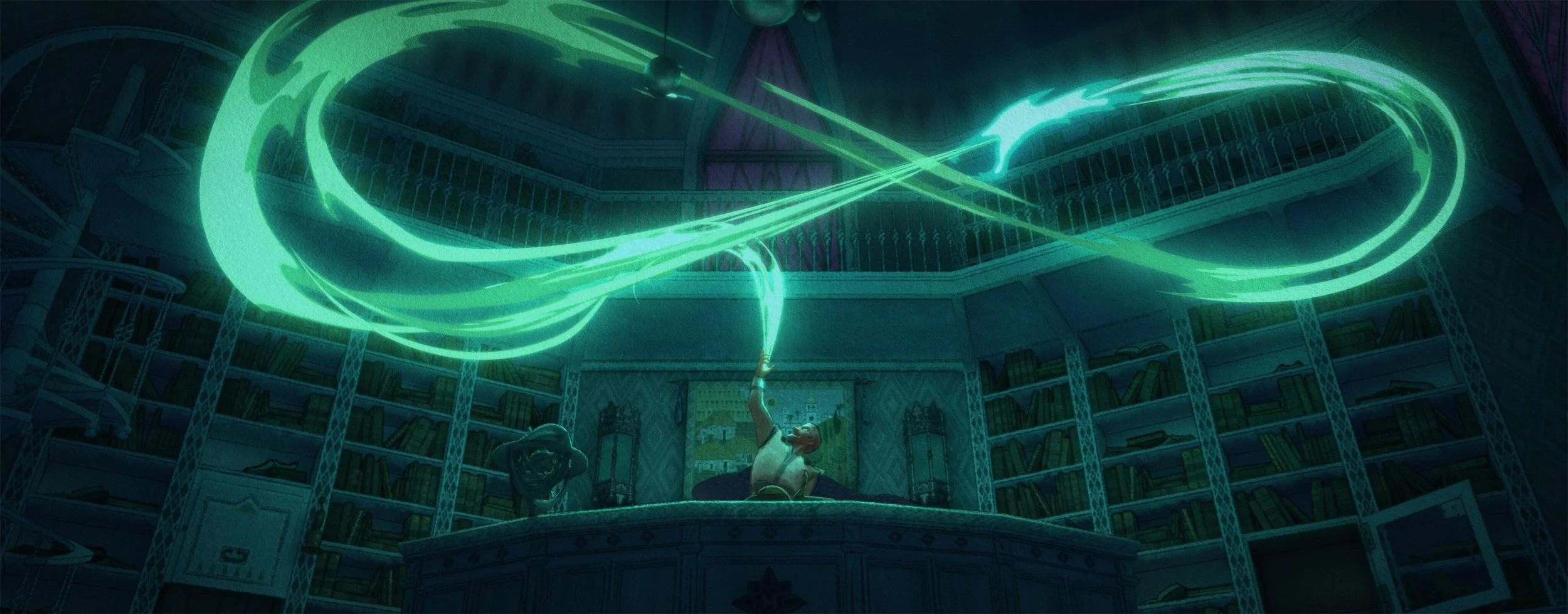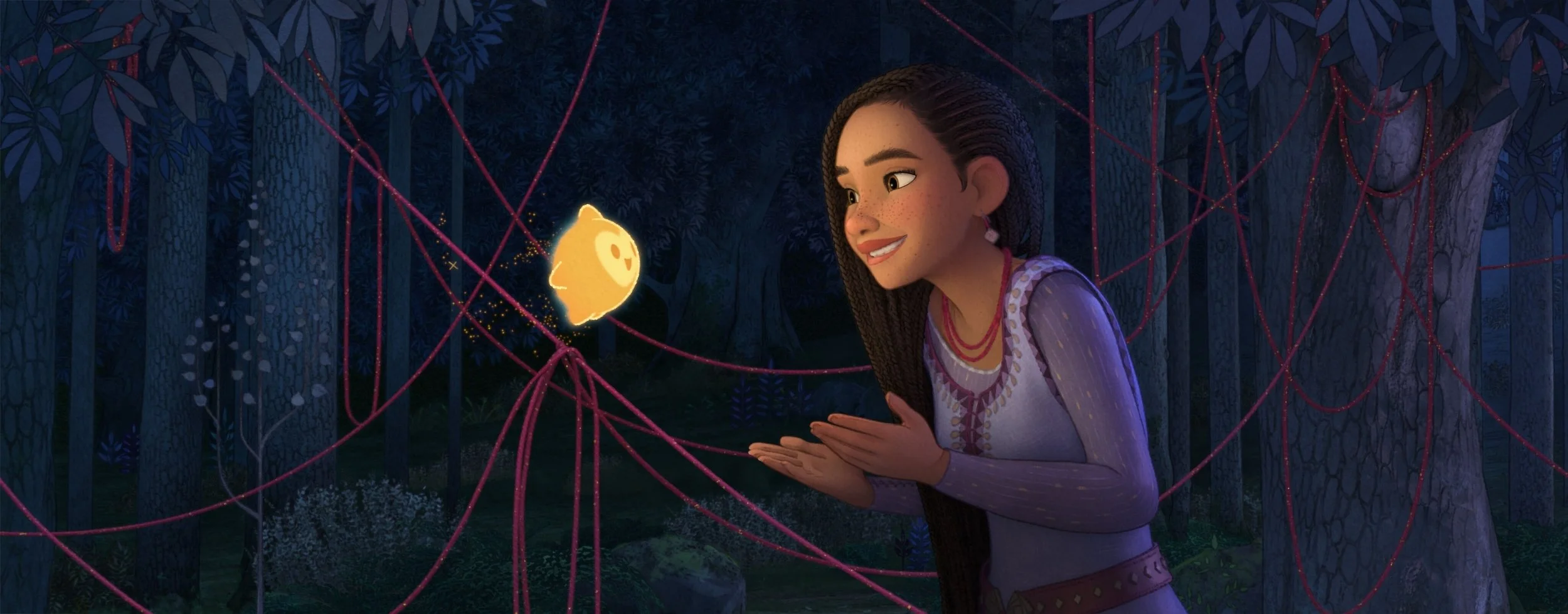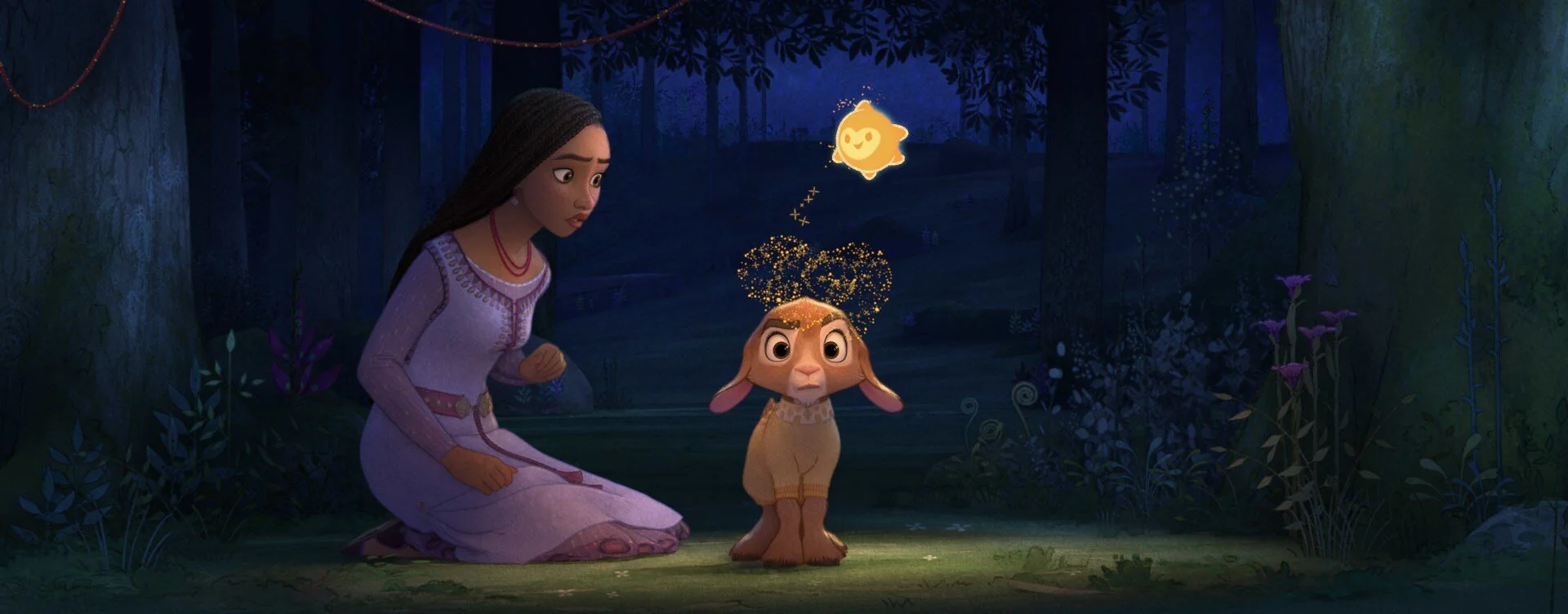Wish | Review
What is a Disney Animated movie? That’s the question Wish, the studio’s latest animated musical, attempts to answer. Released during the studio’s centennial commemoration, the film was made to celebrate “the joy of Disney and make a movie for the fans,” says co-director Chris Buck. And therein lies the problem. Despite having all of the hallmarks of a classic Disney animated film—the “Once upon a time” storybook opening, the spunky heroine, the cute animal sidekick, the “I Want” song—the Disney magic just isn’t there because the film struggles trying to juggle homages to its rich history while trying new things, resulting in a film seemingly doomed from its inception.
Wish is set in the fictional utopian Kingdom of Rosas in the Mediterranean Sea, founded by the sorcerer King Magnifico (Chris Pine) and his wife Queen Amaya (Angelique Cabral). When each citizen of Rosas turns 18, they give their wish to the King for safekeeping, and a few times a year, King Magnifico grants a few of these wishes.
Asha (voiced by Ariana DeBose)
17-year-old Asha (Ariana DeBose) is a tour guide who interviews to become King Magnifico’s new apprentice on the same day as her grandfather Sabino’s 100th birthday, and she hopes the king will finally grant Sabino’s wish. When she learns her once-thought benevolent king has no intention of granting her grandfather’s wish, that most citizens of Rosas’ wishes are never granted, and that the king erases the memories of each citizens’ respective wishes when they give them to him, Asha makes a desperate wish to the stars above. Miraculously, an actual anthropomorphic wishing star (dubbed “Star”) materializes, and it has its own magical abilities. (It gives Asha’s pet goat Valentino, voiced by Alan Tudyk, the ability to speak.) King Magnifico feels threatened by the sudden appearance of another magical being, and puts a manhunt out for Asha and Star.
“We have been inspired by so many iconic films over Disney Animation’s 100 years,” says co-director Fawn Veerasunthorn, Raya and the Last Dragon’s head of story, in her directorial debut, “especially stories where we explore the power of someone with a wish, combined with the conviction to make that wish come true.” Centering the story around wishes is a cute idea; it thematically makes sense for a film meant to honor the studio’s 100-year legacy. But instead of feeling like a triumphant celebration of the world’s oldest animation studio, Wish feels more like a masturbatory act of corporate branding and self-importance, thanks to its countless callbacks, easter eggs, and cameos related to earlier Disney animated films. (“We’re all shareholders” is a line from one of the film’s songs, which sounds more like an admittance of guilt.)
King Magnifico (voiced by Chris Pine)
It’s possible I would’ve been more forgiving if we weren’t already living in an age where the industry is obsessed with nostalgia and fan service, which Disney has been leading the charge through its Marvel and Star Wars properties. But Wish’s winking references feel hollow instead of heartwarming as intended because they feel forced and insignificant. And it doesn’t help that years earlier the studio had already released a film filled with Disney references—Ralph Breaks the Internet.
To their credit, the filmmakers behind Wish are more nuanced in their approach to honoring Disney’s previous films and characters than Ralph Breaks the Internet was. For instance, the film is presented in a wider 2.55:1 aspect ratio, a nod to Sleeping Beauty’s epic aspect ratio. Additionally, Asha has seven friends, all of whom are inspired by and sharing the same qualities as the dwarfs from Snow White and the Seven Dwarfs: Dahlia (Jennifer Kumiyama) is the embodiment of Doc, Gabo (Harvey Guillén) is Grumpy, Hal (Niko Vargas) is Happy, Simon (Evan Peters) is Sleepy, Safi (Ramy Youssef) is Sneezy, Dario (Jon Rudnitsky) is Dopey, and Bazeema (Della Saba) is Bashful. This nod isn’t as obvious as others in the film, and it’s easy for it to go right above most audience’s heads, but the writers do the film a big disservice by trying too hard to make sure we are in on the joke when, late in the film, Gabo describes himself as “grumpy,” just in case we didn’t get the reference the first time. But Asha didn’t need seven friends in this film. In fact, they’re all practically useless and play no major role, save for Dahlia. Asha’s friends become another metaphor for the unnecessary and forced inclusion of ideas just because they’re callbacks to earlier Disney films.
King Magnifico (Chris Pine) and Asha (Ariana DeBose)
Wish’s animation style is a blend of 2-D hand-drawn animation and 3-D computer animation, with a painterly look. I will never criticize a studio for trying something new, so I give credit to Disney for their ambition. But if Disney’s goal was to pave its own groundbreaking lane, Spider-Man: Into the Spider-Verse this is not. While far from looking awful, it’s hard not to think the characters in Wish look like unfinished renderings instead of as an intentional creative decision. It boggles my mind how Wish doesn’t look as good as Day & Night, Paperman, or Feast, all short films from a decade ago from its own studio and sister studio Pixar that combines 2-D and 3-D animation. Ironically, Disney’s rival studio Dreamworks released their own animated feature just last year, Puss in Boots: The Last Wish, which also centered around a wishing star and featured a fresh, groundbreaking animation style, resulting in one of the best films in Dreammwork’s catalog. (Funnily enough, Guillén also voiced a character in The Last Wish, to more memorable effect.) Personally, I think a better way to honor Disney’s legacy would’ve been to return to the studio’s roots and release the film in completely 2-D animation to show the legacy studio’s still got it, which would’ve felt momentous considering the medium’s nonexistence in today’s cinematic landscape.
Another area in which the filmmakers departed from tradition, to their detriment, was in the music. Instead of re-teaming with songwriters and composers they’ve had much success with in the past, like husband-and-wife duo Robert Lopez and Kristen Anderson-Lopez (Frozen and Coco), Lin-Manuel Miranda (Moana and Encanto), or Disney Legend Alan Menken (The Little Mermaid, Beauty and the Beast, Aladdin), they brought in pop songwriters Julia Michaels and Benjamin Rice to write Wish’s songs. The two are clearly talented (Michaels has been nominated for multiple Grammy Awards, including Song of the Year and Best New Artist; Rice has won a Grammy for producing 2018’s A Star Is Born soundtrack), but their musical styling does not fit the Disney mold. The duo lack the musical theater experience the Lopezes, Miranda, and Menken have in blending music with storytelling that progresses the plot or give insight into character motivations, which is why the songs in Wish are not as catchy, not as clever, and are too verbose without reason. (“I let you live hеre for free / And I don't even charge you rent” is an actual line from the movie.)
King Magnifico (Chris Pine)
King Magnifico’s villain song (“This Is the Thanks I Get?!”) doesn’t fit the tone of the actual scene it's set in. King Magnifico is supposed to be furious at that moment, but the song is too upbeat and he comes off just mildly upset. “Welcome to Rosas” is a less fun version of “The Family Madrigal” from Encanto. (The song also refers to Rosas as a city, but isn’t it a kingdom? Unless this is a New York, New York situation.) The film’s intended show-stopper “This Wish” is an underwhelming and clunkier “I Want” song than Frozen’s “Let It Go” or The Little Mermaid’s “Part of Your World”. “At All Costs” is a bland number that appears early in the film that takes up space and feels unnecessary. “I’m A Star” is probably my favorite tune, a fun ensemble number akin to Beauty and the Beast’s “Be Our Guest” and The Little Mermaid’s “Under the Sea”. And “Knowing What I Know Now” is at least interesting, standing out from the pack of pop songs by playing more like a rallying call, like Mulan’s “I’ll Make a Man Out of You”. But who knows, maybe all of the music from Wish will grow on me over time? I was critical of Frozen II and Encanto’s songs in my initial reviews, before loving them later. And the film did at least one thing right with its music—hiring an actual singer (unlike Encanto). Ariana DeBose comes from Broadway (she was in Hamilton), and won an Oscar for her performance in Steven Spielberg’s musical West Side Story. The music of Wish wisely includes DeBose in every song but one.
If Wish failed to uphold the Disney tradition in its animation and music, it, unfortunately, maintains one Disney tradition: the studio’s uninspired designs and characterization in some of its major. While it’s nice that Asha, Disney Animation’s second Black female lead, wears her natural hair, her face looks like every other Disney Princess, just with darker skin. Asha’s personality is the same quirky and adorkable one we’ve seen before in Frozen’s Ana or Tangled’s Rapunzel. And, curiously, I didn’t realize Asha’s mother was still alive (or even a character) until nearly 30 minutes into the movie—and her mother had been on screen the whole time. (Her mother isn’t even referred to as “mom” by Asha until late in the film!)
Asha’s friends, her mother Sakina, her pet goat Valentino, and her grandfather Sabino
Asha’s friends are unmemorable, aside from Dahlia, who’s notable trait is that she’s physically disabled, and Gabo, who’s grumpy all the time. (It’s no coincidence that Dahlia and Gabo have the most screen time and lines among Asha’s seven friends.) Three of Asha’s friends look like variants of Kristoff from Frozen. (Why are the men allowed to have exaggerated features, like comically big noses and ears, while all of the women must conform to conventional beauty standards?)
In the postmodern era of Disney Animation, purely evil villains have gone out of vogue. The studio hasn’t had an old-school villain since Tangled! In its place have been bad guys hidden in plain sight, like in Frozen, Wreck-It Ralph, Big Hero 6, and Zootopia. Or they’re concepts, like Mother Earth scorned in Moana, colonialism in Frozen II, or hopelessness and the lack of trust in Raya and the Last Dragon. In King Magnifico, the filmmakers attempt to evoke the classic villains of Disney past. (His green aura resembles Maleficent’s). But his characterization is confusing. Even when Asha learns the King has no intention of granting most wishes, the King seems genuinely concerned, though misguided, about making every wish come true if they’re not beneficial to Rosas or if they threaten his rule. (King Magnifico doesn’t grant Sabino’s wish “to inspire others” because it’s too vague and may inspire dangerous ideas, such as rebellion.) The King doesn’t appear dastardly, just insecure. It isn’t until King Magnifico is drawn to dark magic—in response to Star’s appearance—that he truly transforms into an evil and unsympathetic villain, which makes his ultimate fate, which I won’t spoil, give me mixed feelings, because I’m unsure if the film wants me to root for his downfall, or wish for his rehabilitation.
Star and Asha (Ariana DeBose)
This is a small complaint, but I was bothered by how similar Valentino’s speaking voice was to Sabino’s. I literally thought the two characters shared the same voice actor, and that there was a thematic reason for it. The credits confirmed the characters were voiced by two different actors. I don’t understand why the filmmakers chose to give these two characters such similar voices!
The best character, however, is Star, who looks like a Pokémon. Star’s simple character design (it’s a plushy star-shaped creature with a heart-shaped face) reminds you how great Disney is at creating simple, yet memorable characters. Star is Disney’s greatest character design since Baymax from Big Hero 6. (I want all of the Star plushes and night lights!)
Asha (Ariana DeBose), Star, and Valentino (Alan Tudyk)
Wish is directed by Chris Buck (Tarzan) and Fawn Veerasunthorn, the first Thai and Asian woman to director a Walt Disney Animation Studios film. It’s written by the animation studio’s Chief Creative Officer Jennifer Lee (who co-wrote and co-directed the Frozen films with Buck) and Allison Moore (Powers). As a self-professed Disney Adult (derogatory), and as a fan of this team’s previous works, I was really rooting for this film’s success, hence why I’m so disappointed in the film’s mediocrity. Instead of feeling like a natural step forward for a legacy animation studio, Wish is a film built on contrivance, and it’s not the film worthy of representing 100 years of Disney.
“I make this wish,” Asha sings, “to have something more for us than this.” I, too, wish for something more for us than this.
2.5 out of 4 Kents.
P.S. There was supposed to be an animated short playing before Wish, called Once Upon a Studio, but Disney ultimately decided to release the short weeks before the film, on the actual 100th anniversary of Walt Disney Animation Studios. Like Wish, the short is a love letter to Disney Animation, and features characters from almost every one of the studio’s works. You can watch Once Upon a Studio on Disney Plus. (The short will appear before theatrical showings of Wish in select countries outside of the U.S.)


